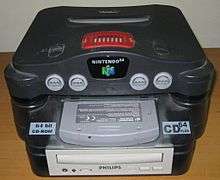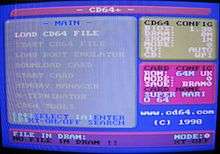CD64 (Nintendo)



The CD64 is a game backup device made by UFO/Success Company for the Nintendo 64 that allows to run ROM files off a CD-ROM attached to the system. Similar to the Doctor V64 and the Z64 units for the N64, it is most commonly used for playing backups of Nintendo 64 games. Since it has a built-in communications port that is accessible from the N64 program, it can also be used as a rather versatile development/debug device.
Design
The CD64 sits underneath the N64 unit, making use of the EXTension port on the bottom of the console. Once connected and plugged in, a game cartridge is taken out of the N64 and one is placed into the slot on the face of the system, just underneath the N64 and just above the CD-ROM drive, to act as a kind of boot disk.
When the unit is turned on, via the N64 power button, a GUI is shown where you can choose to launch the game in the slot, or run the ROM file on the CD in the CD-ROM. The ROM file is loaded into the PC RAM found within the system.
The first version of the unit was solid black, like the N64 itself, and had only 128Mb of RAM. While upgradeable, the RAM was usually glued into place with a hot glue gun. The second version, known as the CD64+ (or 'Plus') was apparently more stable than the first and was transparent grey. This unit came with 256Mb installed, again glued in place, but still capable of being upgraded.
Earlier CD64 models were able to power themselves directly from the N64's expansion bus, but later models require an external power adaptor.
Features
The inserted cart acts as a 'boot' cartridge. The N64 boots the CD64 BIOS using the 6102 CIC in the boot cartridge. The CD64 then boots a program from its cartridge emulator memory using a built-in boot emulator. This presents problems for running programs which have secondary protections against boot emulators, because unlike the V64 and V64Jr, and due to the necessity of the CD64 BIOS to launch a program, it is impossible to use a cartridge with a different boot CIC than the 6102 with the CD64.
The CD64 supports .v64 and .z64 files. After burning the ROM files onto a disc they can be launched from the GUI. There is an embedded cheat and hex editing function, the former of which uses Gameshark format codes, the latter requiring a search of the ROMs code for implementation of cheats. The CD64 unit has SRAM support and can connect with a PC to dump the ROM image from the inserted cart and transfer save files and ROM files back and forth.
Criticisms
- The unit was very cheaply made and shipped with a 9VDC power supply. The 9V input is connected directly to the 12V input of the internal CDROM drive. A voltage regulator is used to obtain a 5V input voltage supply for the mainboard. This converts the unused energy to excess heat, often leading to premature failure.
- Due to the overheating issues some users have modified their units with small cpu processor fans to keep their units cool. Others that used aftermarket power supply units rated for 12V, 1A did not have issues.
- The unit frequently suffers from an incomplete connection between the N64 and the flanges on the top, leading to a black screen at bootup.
- The PC parallel port function requires a special adaptor (PPA, Parallel Port Adaptor) and a DB25 Parallel Port cable that are sold separately. This method is notoriously difficult to set up as the DOS run PC program is difficult to interpret. Software such as cd64comm.exe and ucon64.exe can be used to transfer save files or game images back and forth from the PC to CD64.
- The SRAM function saves to the CD64 RAM, and so if power is lost, the save will also be lost. To store a save permanently requires turning the CD64 back on, selecting the built-in memory manager from the main menu, and then transferring the save to a controller pak. Saves can also be transferred to a PC using Ghemor. If the unit is unplugged the ROM image must also be loaded into the RAM again.
- The CD-ROM control software is poorly written. It treats any operation as a failure if it takes more than a few seconds, which often does not give the drive adequate time to spin up. Successfully reading a disc can take a few well-timed attempts. Long file names are not supported, and it may not read all files from a disc.
- Two games, Conker's Bad Fur Day and Perfect Dark, cannot be read the system unless a Protected Cartridge Decoder (PCD) is used. This cartridge plugs into the slot in the front and has two connectors, one for a boot cartridge such as Super Mario 64, and the other for either the Conker's or Perfect Dark Game Pak. Given the rarity of this accessory, it is often hard to find and expensive when found.
- The unit's design makes it impossible to upgrade beyond 32MB of RAM, which means it cannot play larger ROM images such as Paper Mario or Conker's Bad Fur Day. (These games can still be copied to a PC, however.)
Specifications
- 8x ATAPI CD-ROM (Can be replaced, later firmware allows high speed access to CDs and improved loading times)
- 128 to 256 Mbit (16-32 MB) EDO RAM
- Pro Action Replay/Parallel Comms Link DB25 port (8-bit dual register with handshake)
See also
- Doctor V64
- NEO N64 Myth Cart
- Z64
External links
- the manufacturers new link is now www.superufo.com
- General description of the unit can be found here.
- Information about backup units @ supermagi.com
- Emulators that run on the CD64
- NEO N64 Myth Cart